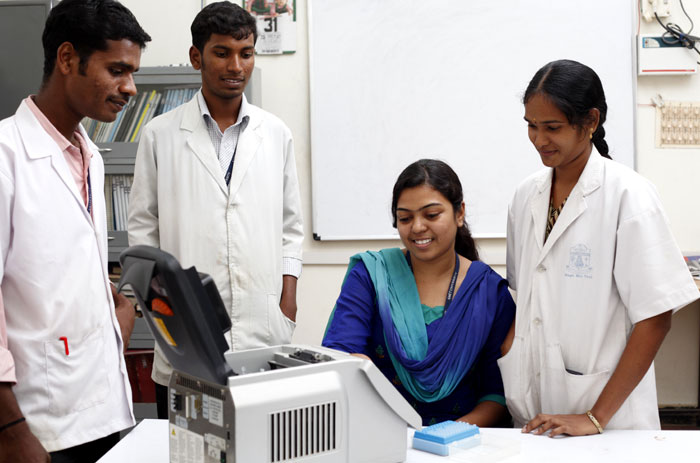
 M.Sc. Physics
M.Sc. Physics
Duration: 2 Years (Four Semester)
Eligibility: Candidate who have passed B. Sc. degree examination with Physics as Major with 55 %.
Intake: 18 per year
Mode of Selection: Based on merit / marks obtained in the Qualifying Examination.
Highlight of the Department
- Highly qualified Research Oriented faculty from reputed Institutions with National and Internation collaborations.
- Publications in Peer reviewed high impact factor journals.
- Government funded projects.
- Areas of Expertise of Faculty: Nanophotonics, Biophotonics, Supercapacitors, Luminescent materials, Crystal growth, Density function theory.
- Having well-equipped laboratories for Material synthesis, treatment, characterization and product development.
- Well-equipped University library with access more than 4,000 online journals and 1000 books exclusively in the Department library.
Programme Highlights
- Trained by highly qualified Research Oriented faculty.
- UGC-NET/SLET/SET exam coaching.
- Well-equipped Research laboratories.
- National and International collaborations.
- Frequent guest lectures by eminent scientists.
- Industry/Research oriented curriculum with research publication.
- Six months project in Industry/National laboratories/Premier Institutions.
- Exposure and training in sophisticated instruments and software.
Higher Education and Avenues
- Pursue Doctoral degree in India and Abroad.
- Opportunities to work as Research analyst in Broad range of Industries.
- Medical Physicist.
- Research Scientist in government sponsored projects.
- Academic teaching jobs in colleges/Universities.
- Scientist in government organizations such as DST, DAE, CSIR Multinational companies.
Programme Objectives
The M.Sc. Physics Programme has been carefully designed to
- To provide sufficient understanding of the fundamentals of physics, with experimental and computational techniques and lay a foundation of lifelong learning.
- To facilitate progressive careers in teaching, in pursuit of higher education, and academia and research, and research labs and related industry.
- To equip our students with sufficient communication, interpersonal, and teamwork skills to enable them to fulfil professional responsibilities, as well as being a knowledgeable person of science in day-to-day affairs.
- To expose them to value-based education with live-in-labs which will enable them to become ethical and responsible towards themselves, co-workers, the society and the Nation.
- .To Inculcate an inquisitive attitude in them through carefully formulated mathematical analysis, computer simulations and laboratory experiments.
- Groom students to cohabitate as a collective group in their place of employment or in their academic career.
- Facilitate the students, if they so desire to opt for higher academic pursuits and help them to equip themselves with knowledge and skills necessary for attaining them.
Programme Outcomes
- Scientific Knowledge and Pursuit: Gain and apply knowledge of basic scientific and mathematical fundamentals, to develop deeper understanding of the Nature and apply it to develop new theories and models.
- Theoretical Methods & Problem Analysis: Develop analytical skills to analyze complex phenomena using first principles enabling one to identify underlying structure.
- Experimental Skills and Development of solutions: Use of research-based knowledge and research methods including design of physical/computational experiments, Design of solutions for complex chemistry/physics/ mathematics problems and evolve procedures appropriate to a given problem.
- Computational, Numerical and Data Analysis: Numerical analysis and simulation modeling and interpretation of data and synthesis of the information to provide valid conclusions.
- Modern Analytical Tool Usage: Select, and apply appropriate techniques, resources, and modern analytical tools.
- Scientific Communication: Communicate orally and in writing on complex scientific activities with peers, educators, science community and with society at large, such as being able to comprehend and write effective scientific articles, make effective presentations, and give and receive clear instructions.
- Individual and team work: Think critically and work independently and as a member or leader in diverse teams and in multidisciplinary settings.
- Project management and finance: Demonstrate knowledge and understanding of the scientific and management principles and apply these to one’s own work, as a member and leader in a team, to manage projects and in multidisciplinary environments.
- Ethics: Apply ethical principles and commit to professional ethics and responsibilities and norms of scientific practice.
- The scientist and society: Apply reasoning through the contextual knowledge to assess societal, health, safety, legal and cultural issues and the consequent responsibilities relevant to the professional scientific practice.
- Environment and sustainability: Understand the impact of scientific processes in societal and environmental contexts and demonstrate the knowledge and need for sustainable development.
- Life-long learning: Recognize the need for and have the preparation and ability to engage in independent and life-long learning in the broadest context of scientific and technological changes for up-to-date research and teaching methods.